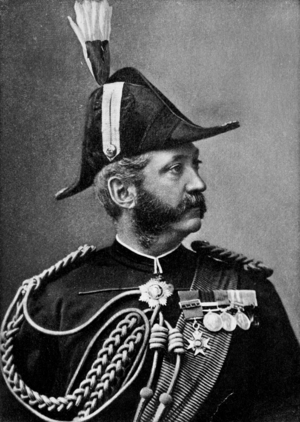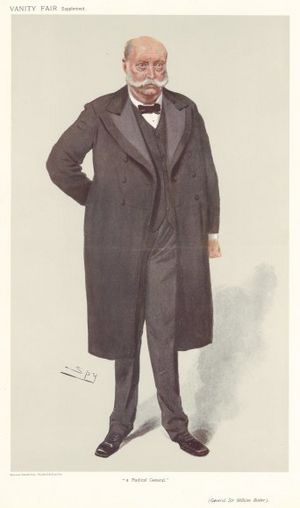William Butler (British Army officer) facts for kids
Quick facts for kids
Sir William Butler
|
|
|---|---|

Lt. Gen. Sir William Butler
|
|
| Born | 31 October 1838 Golden, County Tipperary, Ireland |
| Died | 7 June 1910 (aged 71) Bansha, County Tipperary |
| Buried |
Killaldriffe
|
| Allegiance | |
| Service/ |
|
| Rank | Lieutenant General |
| Unit | 69th Foot |
| Commands held | South Africa |
| Awards | Knight Grand Cross of the Order of the Bath |
Sir William Francis Butler (born 31 October 1838, died 7 June 1910) was an Irish officer in the British Army. He was also a talented writer and an adventurer. He lived in the 1800s and early 1900s.
Contents
Sir William Butler's Early Life and Army Start
William Butler was born in a place called Ballyslatteen, in Golden, County Tipperary, Ireland. His parents were Richard and Ellen Butler. He grew up seeing the effects of the Great Famine in 1847. This was a time when many people in Ireland suffered from hunger and were forced to leave their homes. These sad events stayed with him. He went to school at Tullabeg College, which was run by the Jesuits.
In 1858, William joined the army as a young officer, called an ensign. He was part of the 69th Foot regiment at Fermoy Barracks. He became a captain in 1872 and a major in 1874.
Adventures and Military Achievements
William Butler was a brave soldier and took part in several important military missions.
Exploring Canada: The Red River Expedition
From 1870 to 1871, he was part of the Red River Expedition in Canada. This mission helped to deal with a rebellion in the Red River area. He later wrote a book about his travels and experiences in Canada called The Great Lone Land (1872).
Fighting in Africa: Ashanti and Zulu Wars
He also served in the Ashanti operations in Africa from 1873 to 1874. He worked under a famous general named Wolseley. For his good work, he received an award called the Companion of the Order of the Bath in 1874.
Later, he fought in the Zulu War and the Tel-el-Kebir campaign in Egypt. He also served in Sudan from 1884 to 1886. During this time, he was promoted to colonel and then brigadier-general. In 1886, he was made a Knight Commander of the Order of the Bath.
Family Life and Later Career
On 11 June 1877, William Butler married Elizabeth Thompson. She was a very talented painter, famous for her battle scenes. Some of her well-known paintings include The Roll Call (1874) and Rorke's Drift (1881). They had six children together.
In 1892, he became a major-general and was stationed at Aldershot in England. In 1896, he took command of the South-Eastern District of the British Army.
Leading in South Africa
In 1898, Sir William Butler became the commander-in-chief in South Africa. This was a very important role. He also briefly acted as a high commissioner there. However, his ideas about the possibility of war in South Africa were different from the government's views. Because of this, he was sent back to England. He then commanded the Western District until 1905. He was promoted to lieutenant-general in 1900.
Retirement and Legacy
Sir William Butler retired from the King's service in 1905 when he reached the age of 67. He spent his last years at Bansha Castle in Ireland. He was very interested in education and often gave talks about history, society, and money matters.
He supported the Irish Home Rule movement, which wanted Ireland to have more control over its own government. He was also a member of the Senate of the National University of Ireland. In 1906, he received a high honor, becoming a Knight Grand Cross of the Order of the Bath. He passed away at Bansha Castle in 1910 and was buried nearby in Killaldriffe.
His Writings and Famous Quote
Besides his military career, Sir William Butler was known for his writing. He wrote biographies, which are life stories, of other important figures like Charles George Gordon (1889) and Sir George Colley (1899).
In his biography of Gordon, he wrote a famous quote: "The nation that will insist upon drawing a broad line of demarcation between the fighting man and the thinking man is liable to find its fighting done by fools and its thinking by cowards." This means that a country needs both smart people and brave soldiers to succeed.
Sir William Butler began writing his own life story, but he passed away before finishing it. His youngest daughter, Eileen, completed the book, and it was published in 1911. She found a poem he had written, which showed his love for Ireland.
Images for kids
 | Leon Lynch |
 | Milton P. Webster |
 | Ferdinand Smith |



